THE HINDU – CURRENT NOTE 12 February
 Rescuers form human chain to help whales stranded in New Zealand
Rescuers form human chain to help whales stranded in New Zealand
- Hundreds of volunteers mobilised to help the rescue operation with many working to comfort the stranded whales and keep them cool in the morning heat while they waited to re-float them on the high tide.
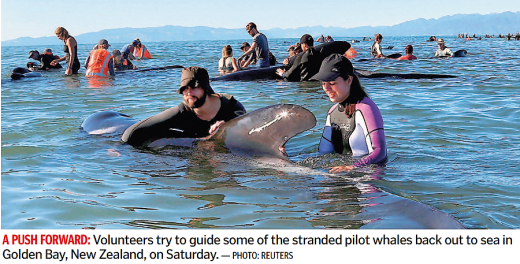
- Another 200 whales were stranded on a New Zealand coastline late on Saturday, frustrating rescuers who had battled through the day and even defied a shark threat to try and keep them at sea. The whales were re-floated at high tide in the late morning but linked up with a so-called “super pod” of another 200 whales gathered off shore.
- Department of Conservation (DOC) officials made the decision to leave the whales overnight as it became too risky to continue efforts to re-float them as darkness approached.
- The crisis began on Friday when a pod of 416 whales became stranded on Farewell Spit in Golden Bay on the northwest of the South Island. Most of them died but volunteers converged on Saturday on the spit, which is a notorious whale trap, to help in the rescue of 100 survivors.
- Rescuers waded into neck-deep water, defying a shark threat to form a human wall and guide the survivors out to sea while also prevent the other 200 from coming to shore.
- The large pod of approximately 200 pilot whales that were free-swimming, have stranded. Reasons not known why the super pod came. They may have been picking up some calls from the whales here and come in to respond.
 Gender of foetus can affect pregnant woman’s immunity, says study
Gender of foetus can affect pregnant woman’s immunity, says study
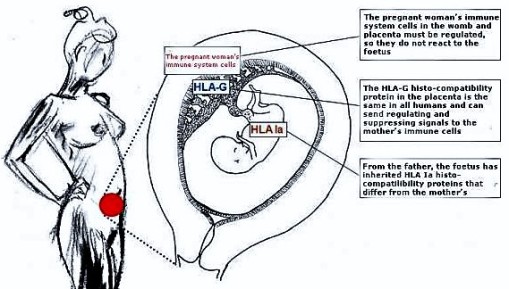
- The immunity of pregnant women can be affected by the gender of the baby, say scientists. They found that women carrying female foetuses showed a heightened inflammatory response.
- A research on 80 pregnant women find out if they exhibited different levels of immune markers called cytokines based on the gender of the foetus.
- Analyses were conducted on the level of cytokines in the blood and levels produced by a sample of immune cells that were exposed to bacteria in the lab.
Study Findings:
- While women didn’t exhibit differences in blood cytokine levels based on foetal sex, it is find that the immune cells of women carrying female foetuses produced more pro-inflammatory cytokines when exposed to bacteria.
- This means that women carrying female foetuses exhibited a heightened inflammatory response when their immune system was challenged.
- Inflammation is a critical part of the immune response involved in wound healing and responses to viruses, bacteria and chronic illnesses. However, excessive inflammation is stressful to the body.
- The heightened inflammation observed among women carrying female foetuses could play a role in why mothers-to-be tend to experience exacerbated symptoms of some medical conditions, including asthma, when carrying a female foetus.
 Markets regulator lays down reforms road map for FY18
Markets regulator lays down reforms road map for FY18

- The Securities and Exchange Board of India (SEBI) on Saturday laid out a road map for reforms for the financial year 2017-18 and plans to bring in a host of changes in various segments including primary market, commodities and foreign investors among others.
- SEBI plans to reduce the listing time gap by bringing down the public issue timeline from the existing requirement of T+6. In other words, shares of a company are currently listed within six days from the day of the issue closure.
- It also plans to allow institutional participation in the commodity derivatives markets in a phased manner. Further, it will work towards integration between the commodity spot market and the derivatives segment.
- The regulator will also initiate consultation with various stakeholders and also design a system of risk-based supervision for commodity brokers.
Cybersecurity lab:
- SEBI also set up a cybersecurity lab for the securities market and set up a facility for online registration of intermediaries. It also plans to allow listing and trading of securitisation receipts issued by Assets Reconstruction Companies.
Meeting Decisions:
- The SEBI board, in a meeting as part of its attempts towards the ‘Ease of Doing Business’ initiative will introduce a common application form for registration, opening of a bank and demat account, and issue of PAN for Foreign Portfolio Investors.
- The board of the regulator approved the proposal for comprehensive review of Securities Contracts (Regulation) (Stock Exchanges and Clearing Corporations) Regulations, 2012 and SEBI (Depositories and Participants) Regulations, 1996 by releasing a consultation paper and seeking public comments.
- The board also took note of the memorandum related to the co-location facility of the National Stock Exchange (NSE) and the examination carried out by the regulator under the guidance of its Technical Advisory Committee (TAC).
- The Board also took note of steps taken by SEBI in consultation with TAC to strengthen the exchange’s trading infrastructure in the areas namely, fair and transparent data dissemination process, tools to monitor service quality of data feeds, mechanism to manage system load in a fair manner, direct connectivity between co-location facilities of exchanges.
 Banks in a position to cut lending rates further: Patel
Banks in a position to cut lending rates further: Patel
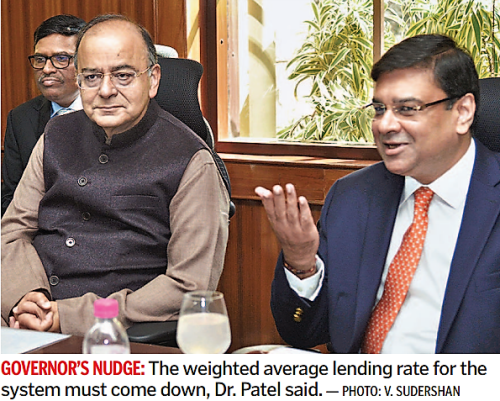
- The central bank, in its monetary policy review last week, had not only decided to hold its benchmark policy interest rates but also shifted its stance from remaining ‘accommodative’ on these key rates to ‘neutral.’
- RBI Governor Urjit Patel said that banks are in a position to reduce their lending rates further as they have so far slashed interest rates only on a few products such as home and personal loans and that their weighted average lending costs are still high.
- The amount of reduction in the repo rate that we have undertaken, combined with the fact that banks have benefited immensely from the influx of CASA (current account, savings account) deposits that have come into the system and the weighted average lending rate reduction has been considerably less.
- The fact is you could look into reducing the interest rate for those sectors in which very little reduction in lending rate has come about so far. Therefore, the weighted average lending rate for the system must come down, said the Patel.
- Concurring with the Finance Minister’s assertion that high non-performing assets in the banking system are largely a legacy issue, the RBI governor said: “The fact of the matter is that the sectors in which the NPAs have emerged over the years, do pertain to the long-gestation projects that were funded before 2011-12, for the most part.
- The resolution of NPAs is an ongoing process, with the Centre and the RBI putting systems in place to deal with them. “Now, it is for individual bankers to get into the exercise of resolving each one of the pending issues,” Jaitley said.
 Turkey referendum on April 16
Turkey referendum on April 16

- Turkey will hold a referendum on April 16 on replacing its parliamentary system with the stronger presidency long sought by incumbent Tayyip Erdogan, electoral authorities announced on Saturday.
- The proposed constitutional reform would mark one of the biggest changes in the European Union candidate country’s system of governance since the modern republic was founded on the ashes of the Ottoman empire almost a century ago.
- It would enable the president to issue decrees, declare emergency rule, and appoint ministers and top state officials. It could also see Erdogan remain in power in the NATO member state until 2029.
 Is Trump’s foreign policy losing its sharp edge?
Is Trump’s foreign policy losing its sharp edge?
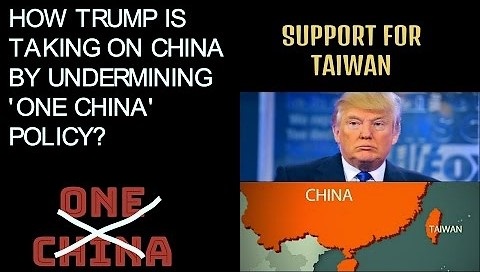
One China Policy:
- President Donald Trump call with President Xi Jinping of China he pledged fealty to One China, a 44-year-old policy under which the U.S. recognised a single Chinese government in Beijing and severed its diplomatic ties with Taiwan.
- Earlier Trump took a phone call from the leader of Taiwan in December and asserted that the U.S. might no longer be bound by the ‘One-China’ policy – the latest delicate issue on which Mr. Trump was willing to challenge decades of diplomatic orthodoxy.
- Secretary of State Rex W. Tillerson, was among those who urged Mr. Trump to publicly endorse the One-China policy as a way to defuse tensions with President Xi.
- Two leaders had not spoken since November 14; administration officials said the Chinese leader would not get on the phone with Mr. Trump without assurances from the administration that he would commit to the policy.
- Trump has also tacked to the centre on Israel. He warned Israelis this week that he did not believe that “going ahead with these settlements is a good thing for peace”.
Committed to Iran deal:
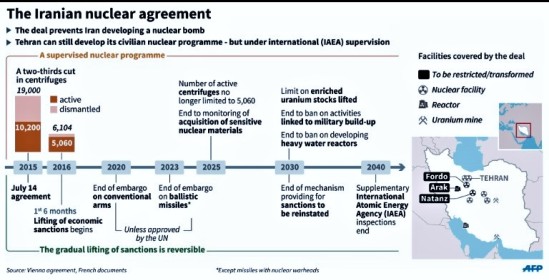
- On Iran issue threatened as a candidate to rip up the nuclear deal struck by President Barack Obama, advisers to the new President told the EU’s top foreign policy official, Federica Mogherini, that the U.S. would fully carry out the agreement.
- The White House’s pledge to carry out the Iran nuclear deal does not reflect a change of heart on Tehran. The administration last week imposed new sanctions on Iran for its launching of a ballistic missile. But officials in the White House are more focused on curbing what they see as a pattern of aggressive behaviour by Iran from Syria to Yemen.
With Japan Mr. Trump characterised America’s alliance with Japan as a “cornerstone of peace and stability.” On Friday, as he welcomed Prime Minister Shinzo Abe of Japan to the White House.
Future certainty:

- The fact that President Trump is proving flexible on some key issues suggests he’s less ideologically driven than his early moves would imply.
- To some extent, Mr. Trump is simply undergoing the same evolution that all of his predecessors went through. Mr. Obama, who ran as an anti-war candidate, became an avid user of drone strikes and other covert counterterrorism operations pioneered by George W. Bush.
- The recalibration is starker because of the extreme nature of the positions he had staked out on issues like China, Russia and the NATO alliance.
 Centre clears five names for SC judges
Centre clears five names for SC judges

- The Union Law Ministry has cleared the names of four High Court Chief Justices and a High Court judge for appointment as Supreme Court judges on recommendations of the Collegium led by Chief Justice of India J.S. Khehar.
- Among those recommended are the Chief Justice of the Madras High Court, S.K. Kaul, the Chief Justice of the Kerala High Court, M. Santhanagouder, the Chief Justice of the Rajasthan High Court, Naveen Sinha, the Chief Justice of the Chhattisgarh High Court, Dipak Gupta, and Justice S. Abdul Nazeer of the Karnataka High Court.
- The Supreme Court, which has the sanctioned strength of 31 judges, now has eight vacancies. The decision comes when the working strength of the court is at an all-time low in recent years. While three more judges are to retire this year, seven more will superannuate in 2018.
- The issue of vacancies in the higher judiciary and the Memorandum of Procedure for the appointment of judges had not long ago caused some friction between the government and the Supreme Court, with the then Chief Justice of India, Tirath Singh Thakur, publicly expressing concern and asking the government to expedite the appointments.
- The draft Memorandum of Procedure is yet to be finalised, with the government still in discussions with the court. In October 2015, a Constitution Bench struck down the National Judicial Appointments Commission law.
 What is the Thor experiment?
What is the Thor experiment?
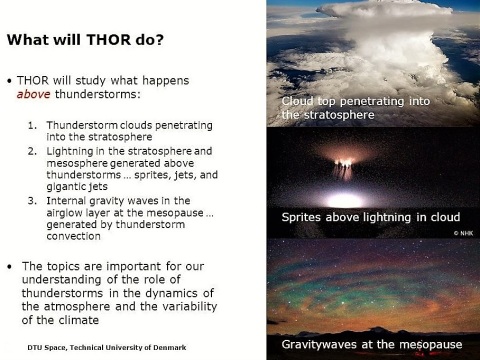
- Inspired by the hammer-wielding character, Thor, from Norse mythology the eponymous experiment aims to investigate electrical activity from thunderstorms.
- Between 10 and 100 kilometres in the atmosphere, the interaction between charged particles produces a variety of dazzling electric phenomena from blue jets to red sprites.
- The Thor experiment will look at them with a thundercloud imaging system from the vantage point of the International Space Station.
- The key aims of the study include understanding how these discharges influence water vapour levels, cloud formation, and eventually changes in climate.
 Protein volume paradox resolved
Protein volume paradox resolved
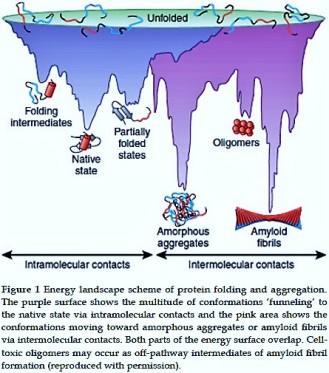
- Durable proteins make life possible in the crushing depths of the ocean and may have evolved in life below the surface of ice-bound oceanic exo-planets. These proteins stay folded — allowing them to perform their function — under immense pressures.But other proteins unfold under pressure, rendering them inoperable.
- The difference between them For one thing, volume. Now, research published this week in Nature Communications makes it possible to predict how volume for a given protein will change between the folded and unfolded state.
- Computations accurately predict how a protein will react to increased pressure, shed light on the inner-workings of life in the ocean depths, and may also offer insights into alien life.
 India’s own interceptor missile soars high
India’s own interceptor missile soars high

- An indigenously developed interceptor missile on Saturday successfully destroyed an incoming ballistic missile in a direct hit, demonstrating the capability of India’s Ballistic Missile Shield (BMD), which is under development.
- India successfully conducted a test wherein an incoming ballistic missile target was intercepted by an exo-atmospheric interceptor missile off the Bay of Bengal.
- As part of the test, a target missile mimicking an enemy ballistic missile with a range of 2,000 km was launched from an Indian Navy ship stationed in the Bay of Bengal and the missile travelled towards the coast, reaching a very high altitude, officials said. It was engaged and destroyed at a height of over 50 km.
- The weapon systems radars located far off have detected and tracked the target. The mission computer predicting the trajectory of the target has launched the interceptor missile from Dr. Abdul Kalam Island at appropriate time based on the trajectory of the target missile.
- The BMD is being developed by the Defence Research and Development Organisation (DRDO) as a two layered system to tackle incoming targets at endo and exo atmospheres.
- With this test, India has crossed an important milestone and has entered an exclusive club of four nations with developing capabilities to secure its skies and cities against hostile threats.
 Green drive on blue waters — solar power lights up naval vessel
Green drive on blue waters — solar power lights up naval vessel
- In a first, Naval survey vessel INS Sarvekshak of the Navy has turned to the sun to generate a share of its on-board power, based at the Southern Naval Command in Kochi, has innovatively deployed the zero-maintenance solar power system, capable of generating 5.4KW electricity, by customising and installing ‘razor-thin, flexible’ solar panels on the canopy of its telescopic (retractable) helicopter deck.
- This replaces the ship’s traditional 4.4KW emergency diesel alternator, thereby slashing a yearly carbon emission of 60,225 kg and saving 22,995 litres of diesel for the Navy.

Low cost system:
- The project, taken up by the ship’s electrical wing headed by Commander Sreejith Tampi as part of an innovation drive, cost about ₹19 lakh, which is recoverable in under three years.
- Rigid, glass-topped solar panels are unsuitable in the humid, salty marine environment, as they cannot withstand high wind speeds. They were found to be unfit for fitment on ships and they needed to be stationary for the sensors to receive sunlight. Conventional, fume-emitting batteries posed a further challenge, as they are not advisable over turbulent seas.
- Solar Panels Imported from U.S have a maintenance free life for 24 years while the no-fume solid electrolyte batteries have a guaranteed life of 20 years. The ship is 15 years old and we hope the system stays through the vessel’s service life.
- The industrial grade panels are found to be performing well in all-light conditions and are shade-tolerant. The system is expected to save ₹8.98 lakh used to run the vessel’s emergency diesel alternator.
 One in three kids worried about safety in school: report
One in three kids worried about safety in school: report
- 7th global survey- “Small Voices, Big Dreams” – conducted by international development group, ChildFund Alliance in 41 countries, including developing and developed nations reports that One in every three children in India feels their school is not safe “sometimes”, while citing deficient infrastructure and lack of toilets among their biggest concerns.
- The report captured children’s views on education and safety in their school. Views of more than 6,000 children, aged between 10 and 12 years in 41 countries, were studied in the survey.
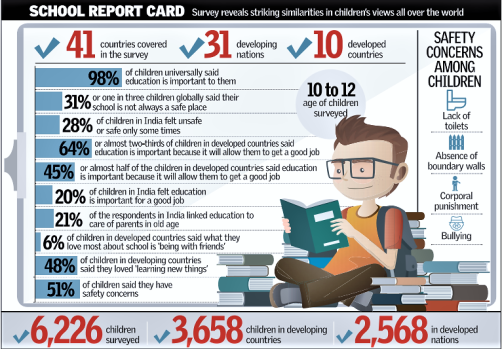
Key findings:
- The key findings for India revealed that nearly one in three children are concerned about their safety in school. The findings highlighted striking similarities and differences between children in different parts of the world.
- While children almost universally agreed that education was important, a third of the respondents in India (28%) said their school is only ‘sometimes’ safe (in line with the global finding of 31%) – citing deficient infrastructure and lack of toilets, boundary walls and first-aid facilities among their greatest concerns.
Other concerns:
- The children also spoke of corporal punishment and bullying among their main concerns.
- In developing countries, 21 per cent of children said being safe at school means school buildings and facilities which are clean, safe and in good repair – with this response being highest among children surveyed in India (58%), Ethiopia (55%) and Bangladesh (54%).
- In India, children defined safety at school as having a clean and safe building (58%), having proper preventive security measures in place (46% – ranging from ‘out of bound’ areas, to protection from strangers, to supervision by teachers; while 23% of children described feeling safe as not being the target of physical or emotional abuse or violence, with many children referring to corporal punishment and “no bullying”.
Grey area:
- The survey reveals that many children are concerned about their personal safety at school which will prove to be an impediment in their overall development and growth.
 NGT asks CPCB for report on manja
NGT asks CPCB for report on manja
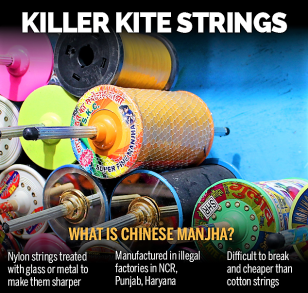
- The National Green Tribunal (NGT) has directed the Central Pollution Control Board (CPCB) to submit a report about the composition of glass-coated kite strings, popularly called ‘manja’, and its harmful effects on human health and the environment.
- The tribunal also asked the CPCB whether nylon strings of any ply are degradable or not, besides directing it to prescribe the standards of ‘tensile strength, thickness or other parameters that should be recommended for manja’.
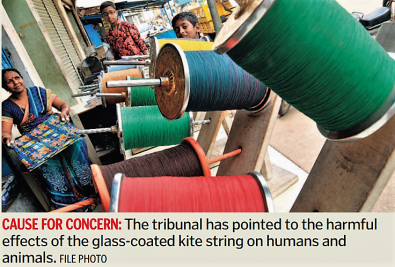
- Bench directed the apex pollution monitoring body to file a detailed report in this regard, including the ‘acceptable’ grade of manja, before February 16, which is the next date of hearing.
- The CPCB submits that they would place the report of analysis. It is also directed to submit a complete report in this regard, including the acceptable grade, before the tribunal before the next date of hearing,” the Bench said.
- Earlier, the NGT had imposed an interim nation-wide ban on the use of ‘manja’, noting that the sharp string posed a danger to humans and animals.
